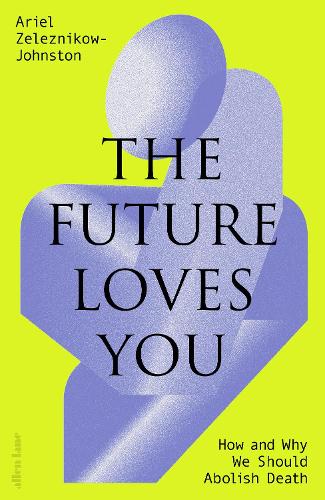
The Future Loves You: How and Why We Should Abolish Death
(Hardback)
Publishing Details
The Future Loves You: How and Why We Should Abolish Death
By (Author) Dr Ariel Zeleznikow-Johnston
Penguin Books Ltd
Allen Lane
25th February 2025
28th November 2024
United Kingdom
Classifications
General
Non Fiction
Neurosciences
Social forecasting, future studies
Philosophy of science
Cognitive studies
Sociology: death and dying
Ethical issues: scientific, technological and medical developments
303.49
Physical Properties
Hardback
368
Width 165mm, Height 240mm, Spine 30mm
575g
Description
A brilliant young neuroscientist explains how to preserve our minds indefinitely, enabling future generations to choose to revive us Just as surgeons once believed pain was good for their patients, some argue today that death brings meaning to life. But given humans rarely live beyond a century - even while certain whales can thrive for over two hundred years - it's hard not to see our biological limits as profoundly unfair. No wonder then that most people nearing death wish they still had more time. Yet, with ever-advancing science, will the ends of our lives always loom so close For from ventilators to brain implants, modern medicine has been blurring what it means to die. In a lucid synthesis of current neuroscientific thinking, Zeleznikow-Johnston explains that death is no longer the loss of heartbeat or breath, but of personal identity - that the core of our identities is our minds, and that our minds are encoded in the structure of our brains. On this basis, he explores how recently invented brain preservation techniques now offer us all the chance of preserving our minds to enable our future revival. Whether they fought for justice or cured diseases, we are grateful to those of our ancestors who helped craft a kinder world - yet they cannot enjoy the fruits of the civilization they helped build. But if we work together to create a better future for our own descendants, we may even have the chance to live in it. Because, should we succeed, then just maybe, the future will love us enough to bring us back and share their world with us.
Reviews
What is death The Future Loves You challenges you, with fascinating real-life examples and entertaining thought experiments, to think more deeply about what death means on a neurological, philosophical, ethical and deeply personal level. It always surprises me that death is bad can be such a controversial statement, and this book is a fantastic antidote to flippant fatalism. Its also a scientific manifesto for how we could use future biomedical technology to overcome deathand how the future that loves you could be nearer than you think ... this book will change the way you think about deathand hopefully raise these important questions in wider society, too -- Andrew Steele, author of Ageless
Dear future, we love you too. This book elegantly handles the why and how of ending death, with engagingly described specific details and compelling responses to standard concerns about overpopulation, social stagnation, and unnaturalness. This thorough dive into the "why" truly primes us for the "how", which also delivers the goods -- Professor George Church, Harvard Medical School & MIT
Everything that makes you mentally unique is encoded in the structural and molecular details of your brains connectome. To map animal connectomes, neuroscientists have developed incredibly effective preservation methods. The emerging science of brain preservation seeks to adapt these methods to preserve human brains for centuries-long storage. This brilliantly written book provides the first comprehensive overview of what brain preservation is, how it could be used to stop people from dying, and how it could be made to work verifiably and at scale. As a neuroscientist who has been working in this field for decades, I am delighted that Zeleznikow-Johnston has produced a work that is scientifically rigorous while being simultaneously extremely accessible for all readers, whatever their background -- Dr Ken Hayworth, Senior Scientist at Howard Hughes Medical Institute
Author Bio
Dr Ariel Zeleznikow-Johnston is a neuroscientist at Monash University, Australia, where he investigates methods for characterising the nature of conscious experiences. In 2019, he obtained his PhD from The University of Melbourne, where he researched how genetic and environmental factors affect cognition. His research interests range from the decline, preservation and rescue of cognitive function at different stages of the lifespan, through to comparing different people's conscious experience of colour. By contributing to research that clarifies the neurobiological, cognitive, and philosophical basis of what it is to be a person, he hopes to accelerate the development of medical infrastructure that will help prevent him and everyone else from dying.
